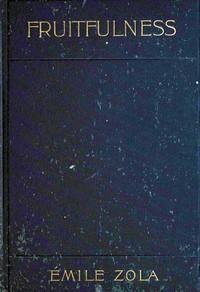|
|
Read this ebook for free! No credit card needed, absolutely nothing to pay.Words: 173146 in 43 pages
This is an ebook sharing website. You can read the uploaded ebooks for free here. No credit cards needed, nothing to pay. If you want to own a digital copy of the ebook, or want to read offline with your favorite ebook-reader, then you can choose to buy and download the ebook.

: Fruitfulness by Zola Mile Vizetelly Ernest Alfred Translator - French fiction Translations into English@FreeBooksTue 06 Jun, 2023 Produced by: David Widger and Dagny FRUITFULNESS BY ?MILE ZOLA Ernest Alfred Vizetelly NEW YORK DOUBLEDAY, PAGE & CO. 1900 TRANSLATOR'S PREFACE "FRUITFULNESS" is the first of a series of four works in which M. Zola proposes to embody what he considers to be the four cardinal principles of human life. These works spring from the previous series of The Three Cities: "Lourdes," "Rome," and "Paris," which dealt with the principles of Faith, Hope, and Charity. The last scene in "Paris," when Marie, Pierre Froment's wife, takes her boy in her arms and consecrates him, so to say, to the city of labor and thought, furnishes the necessary transition from one series to the other. "Fruitfulness," says M. Zola, "creates the home. Thence springs the city. From the idea of citizenship comes that of the fatherland; and love of country, in minds fed by science, leads to the conception of a wider and vaster fatherland, comprising all the peoples of the earth. Of these three stages in the progress of mankind, the fourth still remains to be attained. I have thought then of writing, as it were, a poem in four volumes, in four chants, in which I shall endeavor to sum up the philosophy of all my work. The first of these volumes is 'Fruitfulness'; the second will be called 'Work'; the third, 'Truth'; the last, 'Justice.' In 'Fruitfulness' the hero's name is Matthew. In the next work it will be Luke; in 'Truth,' Mark; and in 'justice,' John. The children of my brain will, like the four Evangelists preaching the gospel, diffuse the religion of future society, which will be founded on Fruitfulness, Work, Truth, and Justice." "Fruitfulness" is a book to be judged from several standpoints. It would be unjust and absurd to judge it from one alone, such, for instance, as that of the new social religion to which I have referred. It must be looked at notably as a tract for the times in relation to certain grievous evils from which France and other countries--though more particularly France--are undoubtedly suffering. And it may be said that some such denunciation of those evils was undoubtedly necessary, and that nobody was better placed to pen that denunciation than M. Zola, who, alone of all French writers nowadays, commands universal attention. Whatever opinion may be held of his writings, they have to be reckoned with. Thus, in preparing "Fruitfulness," he was before all else discharging a patriotic duty, and that duty he took in hand in an hour of cruel adversity, when to assist a great cause he withdrew from France and sought for a time a residence in England, where for eleven months I was privileged to help him in maintaining his incognito. "Fruitfulness" was entirely written in England, begun in a Surrey country house, and finished at the Queen's Hotel, Norwood. It would be superfluous for me to enter here into all the questions which M. Zola raises in his pages. The evils from which France suffers in relation to the stagnancy of its population, are well known, and that their continuance--if continuance there be--will mean the downfall of the country from its position as one of the world's great powers before the close of the twentieth century, is a mathematical certainty. That M. Zola, in order to combat those evils, and to do his duty as a good citizen anxious to prevent the decline of his country, should have dealt with his subject with the greatest frankness and outspokenness, was only natural. Moreover, absolute freedom of speech exists in France, which is not the case elsewhere. Thus, when I first perused the original proofs of M. Zola's work, I came to the conclusion that any version of it in the English language would be well-nigh impossible. For some time I remained of that opinion, and I made a statement to that effect in a leading literary journal. Subsequently, however, my views became modified. "The man who is ridiculous," wrote a French poet, Barth?lemy, "is he whose opinions never change," and thus I at last reverted to a task from which I had turned aside almost in despair. Of course, these lady critics did not favor certain features of the original, and one of them, indeed, referred to the evil denounced by M. Zola as a mere evil of the hour, whereas it has been growing and spreading for half a century, gradually sapping all the vitality of France. But beside that evil, beside the downfall of the families it attacks, M. Zola portrays the triumph of rectitude, the triumph which follows faith in the powers of life, and observance of the law of universal labor. "Fruitfulness" contains charming pictures of homely married life, delightful glimpses of childhood and youth: the first smile, the first step, the first word, followed by the playfulness and the flirtations of boyhood, and the happiness which waits on the espousals of those who truly love. And the punishment of the guilty is awful, and the triumph of the righteous is the greatest that can be conceived. All those features have been retained, so far as my abilities have allowed, in the present version, which will at the same time, I think, give the reader unacquainted with the French language a general idea of M. Zola's views on one of the great questions of the age, as well as all the essential portions of a strongly conceived narrative. FRUITFULNESS Free books android app tbrJar TBR JAR Read Free books online gutenberg More posts by @FreeBooks
: Snubby Nose and Tippy Toes by Smith Laura Rountree - Animals Juvenile fiction; Rabbits Juvenile fiction@FreeBooksTue 06 Jun, 2023
|
Terms of Use Stock Market News! © gutenberg.org.in2025 All Rights reserved.






